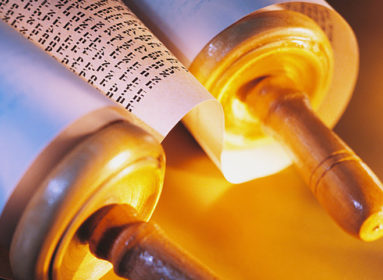By Shlomo Riskin
Our nation, Israel, has just concluded a most intensive Festival period that encompasses a rollercoaster of religious emotions. We have moved from the intense soul searching of Rosh Hashanah to the heartfelt prayers for forgiveness of Yom Kippur. We have built and dwelt for seven days in a make-shift house reminiscent of the booths in the desert as well as of the “fallen sukkah of King David”, the Holy Temple. We have punctuated our prayer for rain with joyous dancing around the Torah, whose reading we conclude just at Festival end. After a full month of festivities, we are now entering our first post festival Sabbath, on which we shall read of the creation of the world.
Although these segments seem disparate, I truly believe that there is a conceptual scheme connecting them all. I also believe that many observant Jews miss the theological thread that unites this particular holiday period because the religious establishment does not sufficiently stress the real message Judaism is trying to teach.
Despite the hundreds of years between them, two great theologians – Rav Yosef Albo (1380-1444), in his Sefer Haikkarim – “Book of Essential Jewish Beliefs” and Franz Rosenzweig (1886-1929) in his “Star of Redemption”– insist that the fundamental principles of Jewish faith are outlined in the three special blessings of the Rosh Hashana Musaf Amidah. Conventional wisdom sees the High Holy Days as frightening days of judgment, but Rosh Hashana actually teaches us that a major function of the Jewish people in this world is to establish the Kingship of our God of love, morality and peace throughout the world. Indeed, chassidim – especially Chabad – refer to the night of Rosh Hashanah as the Night of the Coronation.
Yom Kippur is our Day of Forgiveness. In order for us to dedicate ourselves to the task of bringing the God of compassionate righteousness and justice to the world in the coming year, each of us must take to the task with renewed vigor. We can only muster the necessary energy if we have successfully emerged from our feelings of inadequacy resulting from improper conduct towards humanity and to God.
Yom Kippur is not only a day of forgiveness for Jews. Our reading of the Book of Jonah with God’s command that the prophet bring the gentile Assyrians to repentance and the refrain which we iterate and reiterate during our fast, “for My house shall be called a house of prayer for all nations” (Isaiah 56:7) demonstrate that God desires repentance and forgiveness for all of humanity.
The Mussaf Amidah on Yom Kippur describes in exquisite detail every moment of the Temple service for forgiveness; indeed it transports us to the Holy Temple itself. Our sukkah represents the Holy Temple, or at least the model of the sanctuary in the desert after which it was crafted. The guests of the sukkah (ushpizin) are the great personalities of Biblical history, and the most fitting decorations for the sukkah are scenes from the Temple service (so magnificently reproduced by Machzor Hamikdash). It is not accidental that the depiction of the Temple service of the Musaf Amidah in the Yom Kippur service begins by invoking the creation of the world. The Temple should somehow serve as a magnet for all nations and the conduit through which they will accept the Kingship of God and a lifestyle reflecting His morality and love.
Note the following amazing parallels when the Bible describes the building of a sanctuary; it uses the following words: “Behold I have called by name Bezalel the son of Uri the son of Hur from the tribe of Judah and I have filled him with the spirit of God: with Wisdom (Hakhmah), with Understanding (Tevunah and with Knowledge (Daat)” (Exodus 31:2,3)
In the Book of Proverbs, which invokes God’s creation of the world, a parallel verse is found. “The Lord founded the earth with Wisdom (Hakhmah), fashioned the heavens with Understanding (Tevunah) and with Knowledge (Daat) pierced through the great deep and enabled the heavens to give forth dew.” (Proverbs 3:19,20)
Apparently, the Bible is asking us to recreate the world with the Holy Temple from whence our religious teachings must be disseminated throughout humanity.
From this perspective, we understand why our rejoicing over the Torah takes place at the conclusion of this holiday season rather than during the Festival of Shavuot. Pesach and Shavuot are national festivals on which we celebrate the founding of our nation from the crucible of Egyptian slavery and our unique status as the chosen people resulting from the revelation at Sinai.
The Tishrei Festivals are universal in import, focusing on our responsibility to be a Light unto the Nations. This is why on Simchat Torah, we take the Bible scrolls out into the street, into the public thoroughfare and dance with them before the entire world. From this perspective we can well understand why Shemini Atzeret and Simchat Torah move seamlessly into the reading of Bereishit of the creation of the world.
Rabbi Shlomo Riskin is chancellor of Ohr Torah Stone and chief rabbi of Efrat, Israel.








 Southern New England Jewish Ledger
Southern New England Jewish Ledger














